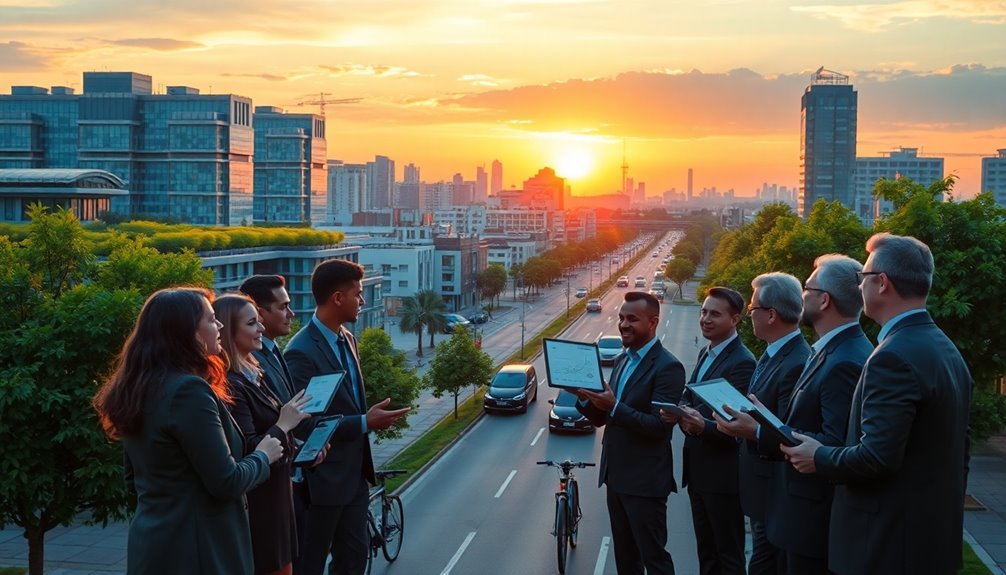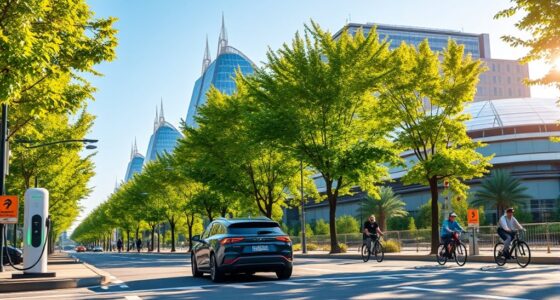Urban decarbonization initiatives are essential for cities aiming to combat climate change while enhancing public health and generating economic opportunities. Effective policies, like the European Green Deal, emphasize sustainable urban planning and equitable community engagement. Tailoring strategies for different sectors, such as electrifying transportation and improving energy efficiency in buildings, proves vital. By involving local residents in decision-making, these initiatives become more successful and sustainable. Explore how these approaches can transform urban areas in your path forward.
Key Takeaways
- Urban decarbonization requires integrating renewable energy while ensuring equitable benefits to prevent social inequalities among communities.
- Effective community engagement is essential for successful urban planning and enhances project acceptance, reflecting local needs and priorities.
- Customized decarbonization strategies for different sectors, such as transportation and building efficiency, are crucial for effective emissions reduction.
- Policies like the European Green Deal emphasize sustainable urban planning, prioritizing equity and environmental justice in community involvement.
- Accelerating decarbonization initiatives generates economic opportunities and improves public health by reducing pollution and fostering community-led solutions.

As urban areas continue to grow, cities face the urgent need to decarbonize their economies and infrastructure. You might wonder how this transition can occur effectively, given the challenges of integrating renewable energy into existing frameworks. Ensuring equitable distribution of benefits is crucial, as it helps prevent widening social inequalities that could arise from these initiatives.
Community engagement plays a significant role in the success of decarbonization projects. When you actively involve local residents in planning and implementation, you foster social acceptance and reduce costs. People are more likely to support initiatives that reflect their needs and priorities, leading to more sustainable outcomes. Legislation like the European Green Deal supports these efforts by mandating sustainable urban planning measures that prioritize equity considerations in community involvement.
Community engagement is essential for successful decarbonization, fostering support and sustainable outcomes through local involvement in planning and implementation.
To achieve substantial carbon emissions reductions, cities are focusing on strategies like electrifying transportation and optimizing energy use in buildings. You'll see innovations such as smart grids and energy-efficient infrastructure becoming more prevalent, enhancing energy distribution and minimizing carbon footprints. Additionally, integrating renewable energy generation is vital for creating carbon-free electricity sectors by 2035.
Decarbonization isn't one-size-fits-all; it requires tailored approaches for different sectors like transportation and industry. You can expect to see improvements in building insulation and energy efficiency measures becoming commonplace. Community-led initiatives will help shape these solutions, ensuring they meet local needs while fostering widespread support.
Equity must remain at the forefront of these efforts, as decarbonization can create new economic opportunities in clean energy sectors. Engaging communities in this process also addresses environmental justice, particularly in areas disproportionately affected by climate change.
As you witness urban decarbonization unfold, remember that reducing pollution improves public health, ultimately benefiting everyone. Through global collaboration and sharing best practices, you'll see cities accelerating their decarbonization journeys, paving the way for a greener future.
Frequently Asked Questions
What Are the Main Challenges in Urban Decarbonization Efforts?
Urban decarbonization efforts face several challenges that you need to be aware of.
You're dealing with legacy buildings that lack energy efficiency, high retrofit costs, and outdated energy systems.
Integrating renewable sources into existing grids is tough due to intermittency issues and the need for smart technologies.
Additionally, financial barriers and inconsistent policies can hinder progress.
Lastly, the high costs of new technologies and the need for continuous innovation complicate the transition.
How Do Cities Measure Their Carbon Emissions Accurately?
Cities measure carbon emissions accurately by using various methodologies, like emissions inventories and the Global Protocol for Community-Scale Greenhouse Gas Emission Inventories.
You'll find some cities focus on emissions within their boundaries, while others consider induced activity. Ground sensors and satellite data provide real-time monitoring, and platforms like Everimpact enhance analysis.
Despite challenges like data accuracy and manual processes, cities strive for comprehensive assessments to inform their decarbonization strategies effectively.
What Role Do Citizens Play in Decarbonization Initiatives?
Citizens play a vital role in decarbonization initiatives by influencing policy, driving behavioral change, and fostering community engagement.
You can advocate for sustainable practices, participate in local energy projects, and contribute to decision-making processes.
By engaging in constructive dialogue and collaborative governance, you help build trust and support for innovative solutions.
Your involvement not only accelerates emissions reduction but also promotes a just transition towards a greener, healthier urban environment for everyone.
How Can Technology Accelerate Urban Decarbonization?
Technology can accelerate urban decarbonization by enhancing energy efficiency and enabling innovative solutions.
You can leverage digital infrastructure like AI and IoT to optimize energy use in real-time. Embracing decentralized systems, such as blockchain for peer-to-peer energy trading, empowers you to participate actively in energy management.
Additionally, adopting smart building technologies and integrating clean energy sources into urban grids can significantly reduce emissions, making your city more sustainable and resilient.
What Financing Options Exist for Urban Decarbonization Projects?
You might think financing urban decarbonization projects is complex, but there are various options available.
You can tap into federal tax credits, state grants, and utility discounts to reduce costs. Consider corporate loans, green bonds, or even energy-as-a-service agreements for funding.
Alternatively, explore internal funds, community initiatives, or carbon offset credits. Each option offers unique benefits, allowing you to choose the best fit for your specific decarbonization goals.
Conclusion
In wrapping up our exploration of urban decarbonization initiatives, it's clear that every city has the potential to be a beacon of sustainability. By embracing innovative policies and strategies, you can lead the charge towards a greener future. After all, isn't it thrilling to imagine our urban landscapes thriving in harmony with nature? Together, we can turn the tide on climate change, ensuring that our cities not only survive but flourish for generations to come.









